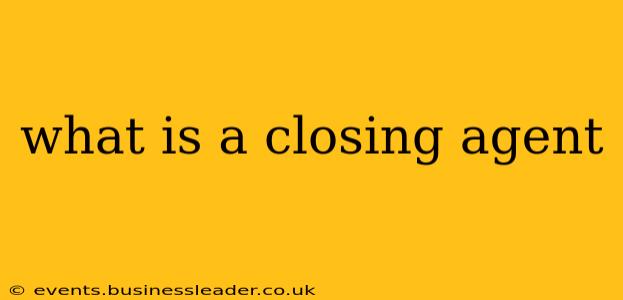Buying or selling a home is a significant life event, often filled with excitement, stress, and a considerable amount of paperwork. Navigating this complex process requires a skilled professional, and that's where the closing agent comes in. A closing agent, also known as a settlement agent or escrow agent, acts as a neutral third party to ensure a smooth and legally sound transfer of ownership. This comprehensive guide will delve into the role of a closing agent, answering common questions and highlighting their crucial contribution to successful real estate transactions.
What Does a Closing Agent Do?
The closing agent's primary responsibility is to manage the closing process, the final step in a real estate transaction. This involves coordinating numerous details to ensure all parties involved meet their obligations. Their tasks include:
-
Preparing Closing Documents: This is a significant part of their job, involving meticulously reviewing and preparing all the necessary legal documents, including the deed, mortgage, title insurance policies, and other relevant paperwork. They ensure all documents are accurate, complete, and legally compliant.
-
Disbursing Funds: The closing agent acts as a custodian of funds, receiving payments from the buyer, seller, and lenders, and then disbursing them according to the terms of the sale agreement. This ensures everyone receives the correct amount at the right time.
-
Title Examination and Insurance: They often work with title companies to ensure clear title to the property, investigating potential issues or liens. This process helps protect both buyer and seller from future disputes regarding ownership. Title insurance policies are also often handled by the closing agent.
-
Recording Documents: After the closing, the closing agent is responsible for recording the deed and other relevant documents with the appropriate county or local authorities. This officially transfers ownership of the property to the buyer.
-
Coordinating with all parties: The closing agent acts as the central point of contact for all parties involved in the transaction, including buyers, sellers, real estate agents, lenders, and title companies. They effectively manage communication and keep everyone informed throughout the process.
Who Pays the Closing Agent?
The costs associated with the closing agent's services are typically split between the buyer and the seller, as outlined in the purchase agreement. The exact division can vary depending on local customs and the specific terms negotiated. It's crucial to review the closing disclosure carefully to understand who's responsible for which fees.
What is the Difference Between a Closing Agent and a Real Estate Agent?
While both play important roles in a real estate transaction, their functions are distinct. A real estate agent represents either the buyer or the seller, advocating for their client's best interests throughout the negotiation and purchase process. The closing agent, however, remains neutral, ensuring a fair and legally compliant transaction for all parties involved.
How to Find a Good Closing Agent?
Choosing a reliable closing agent is critical. Here's how to find a good one:
- Referrals: Ask your real estate agent, friends, family, or other professionals for recommendations.
- Online Reviews: Check online reviews and ratings to gauge the agent's reputation and customer satisfaction.
- Experience: Look for an agent with substantial experience and a proven track record.
- Communication: Choose an agent known for excellent communication and responsiveness.
What are the Potential Risks if I don't use a Closing Agent?
While it might seem possible to handle the closing process without a closing agent, it's generally not recommended. Attempting to manage the complex legal and financial aspects of a real estate transaction without professional assistance significantly increases the risk of errors, delays, and potential legal disputes. A closing agent's expertise minimizes these risks and ensures a smoother, more secure closing.
In conclusion, the closing agent plays a vital role in ensuring a successful real estate transaction. Their expertise in legal documents, financial management, and coordination of multiple parties significantly contributes to a smoother, less stressful, and ultimately safer experience for both buyers and sellers. By understanding their function and choosing a reputable agent, you're taking a significant step toward a successful and legally sound home purchase or sale.
